By Liv Comberti and Mathew Trivett
Hello.
Welcome to the fifth week notes from the OpenCommunity team. Week notes are a short(ish) weekly round up of what we’ve been learning and where we are going next.
Subscribe to get OpenCommunity week notes delivered to your inbox.
TL;DR *
Everyone is trying to reach the same end goal – a shared and accurate picture of what’s out there. But we need to get better at talking to each other and understanding each other’s respective needs regarding how to get there.
* Too long; Didn’t Read – a short summary for busy people.
About the project
OpenCommunity is on a mission to discover the need for a community-services data standard. What might become possible if all community directories in the UK were designed in a way that allowed them to talk to each other?
For more information read the original proposal from the OpenCommunity team.
Question of the week
People believe and seek information from organisations they trust. If for whatever reason they don’t trust their local council, should we work to rebuild their trust, or provide that information via more trusted sources?
What we’ve done
The post-its have been flying here in the Snook office, which means we’ve been a bit behind on our weeknotes. These weeknotes are the second part of a two part special, sharing insights from our research trip to Devon.
In our first post, we shared what we learned about the world of commissioning.
This week, we’ll share insights from our visit to Exeter Library, Pinpoint Devon and conversations with CoLab members. We will talk about how services publicise their offer and how people find them.
What we’ve learned
Feeling the community love at Exeter Library
We visited Exeter Library which is now part of Libraries Unlimited, an innovative staff and community owned mutual. Exeter Library plays a vital role as a community space. Libraries are not just big rooms of books but places where people can access support, learning, social connection, even warm clothes and of course community-related information.
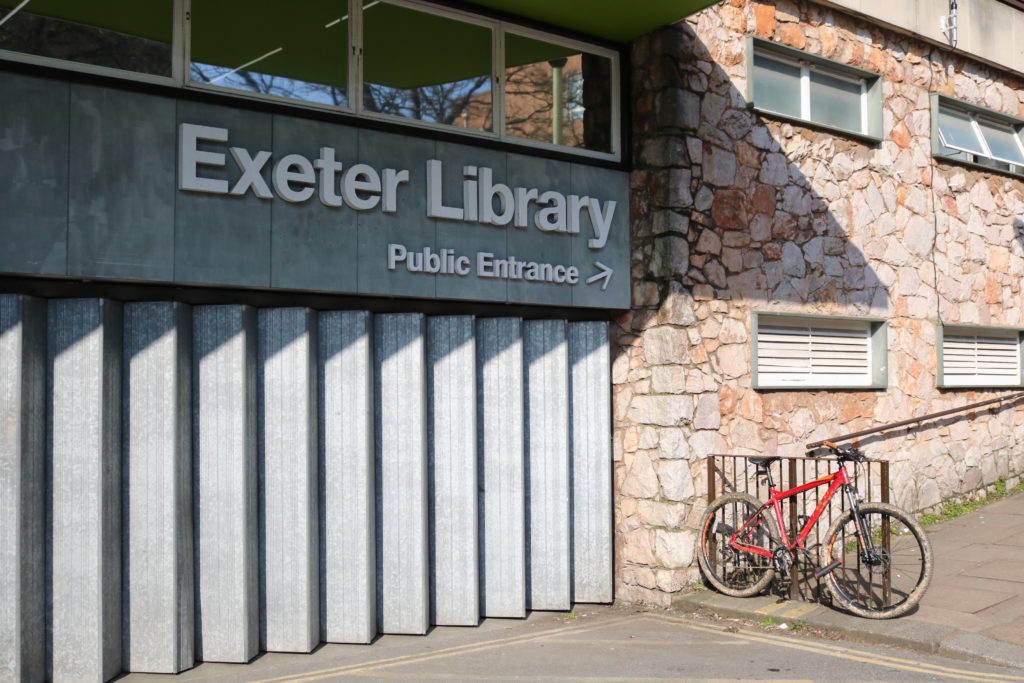
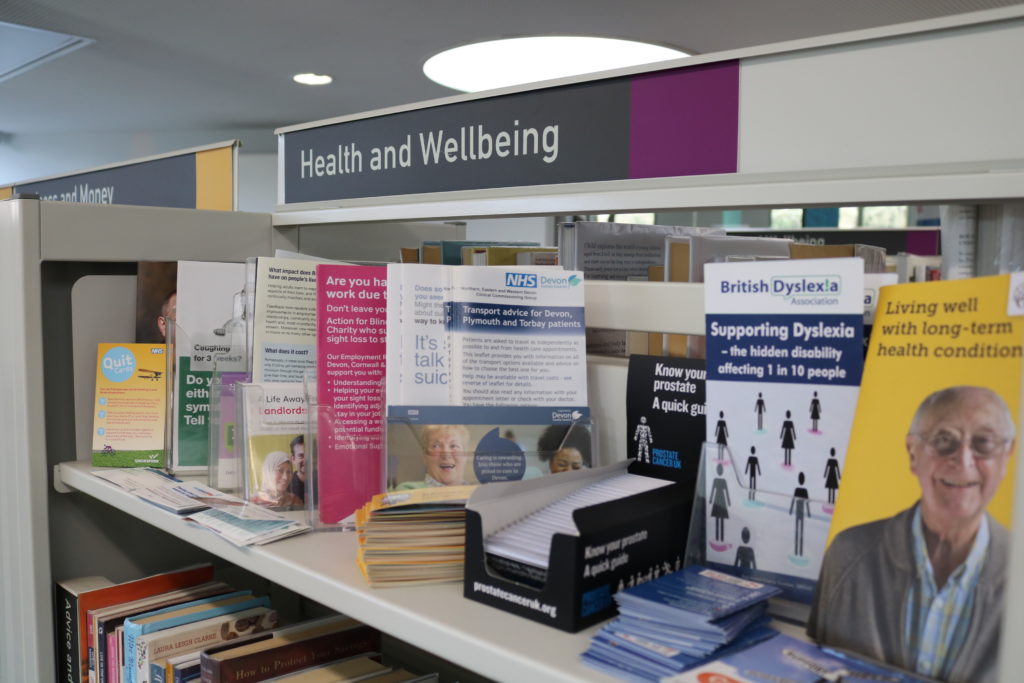
Health and wellbeing service information and advice displayed amongst the stacks 
Libraries are where people expect to find community information
“People associate libraries as having resources.”
Operations Supervisor, Exeter Library
Seems obvious, doesn’t it?! Something struck us after countless conversations with people about community services. Directory owners struggle to build awareness of their directories. Community referrers go to great efforts to build and maintain their own personal lists of services. Service providers struggle (through completely different channels) to promote their services. Libraries, however, don’t seem to share these problems. Providers see the library as a trusted channel to reach the right people with their offer.
The system is rudimentary: community service information consists of ring-bound folders crammed full of flyers in plastic wallets, which are routinely updated by library staff. Finding the information you need this way seems trickier than searching even a poorly designed digital directory.
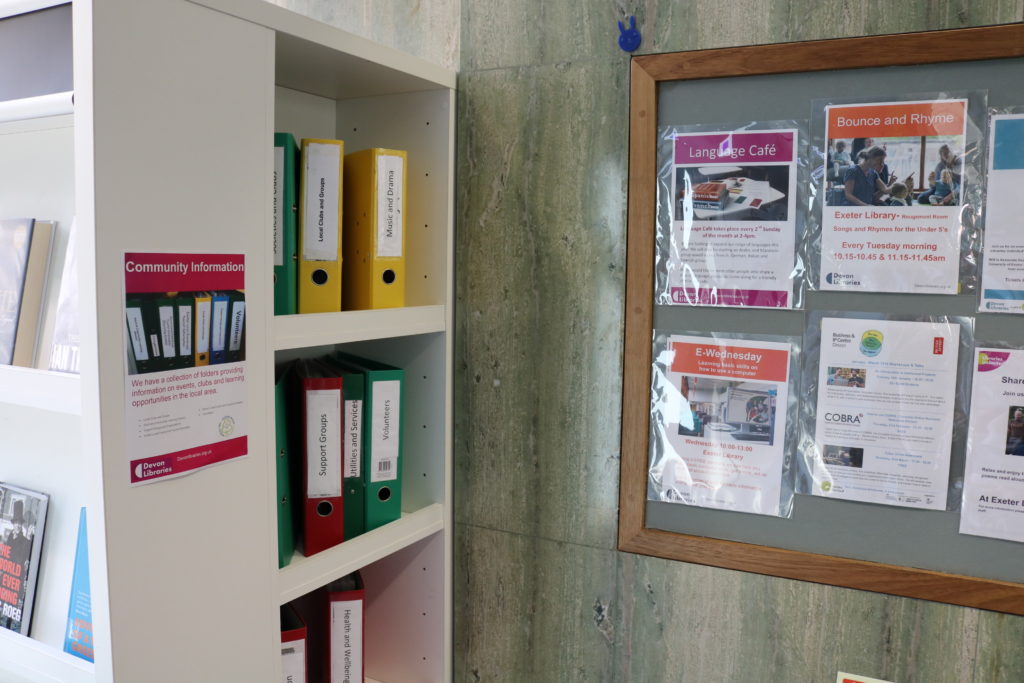
So why are libraries trusted in a way that council directories seem not to be? Is it a question of awareness (people expect to find this information in libraries), users’ lack of digital access or trust?
“Twenty years ago I’d say if the county council were providing that information I’d assume it’s correct. But now I’m not sure. Not because I think they’re untrustworthy, just because of time. I think they’re as time poor as we are.”
Operations Supervisor, Exeter Library
Digital can’t be the only answer
Lack of digital access is certainly a factor. Many people use libraries to find service information because they don’t have their own computers, or are not digitally literate. For them, paper based information or speaking to a human is far more helpful than reading something digital.
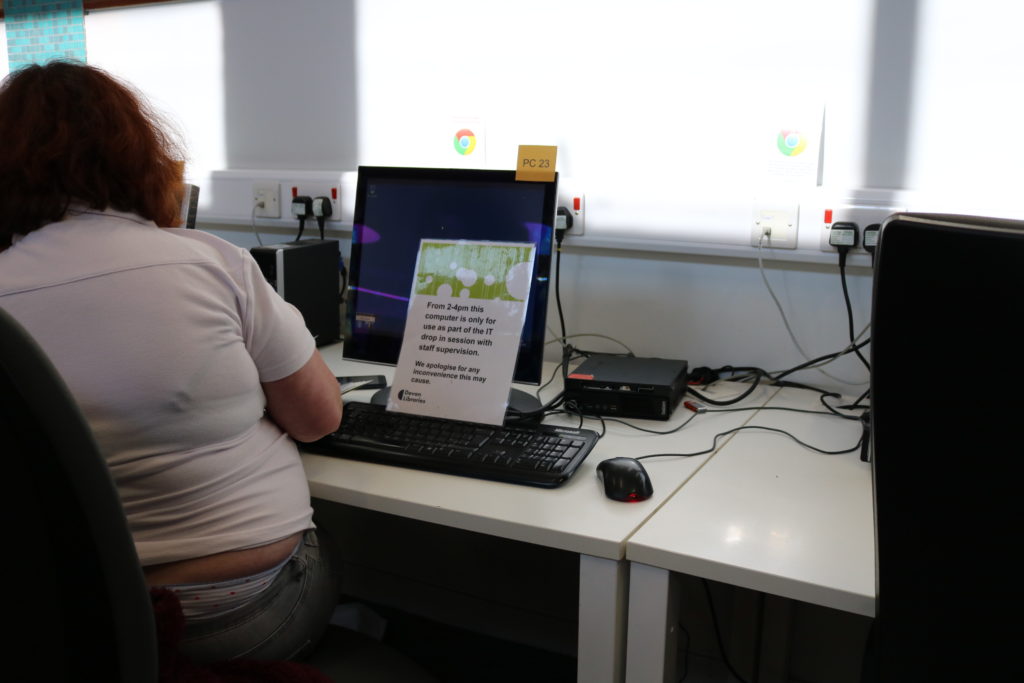
Pinpoint Devon Team
Pinpoint is Devon County Council’s shared directory of services for the whole of Devon County. Unusually, Pinpoint managed to merge their Family Information Service and Adult Social Care information into a single directory. Perhaps as a result, Pinpoint was the most used and talked about directory of those we visited.
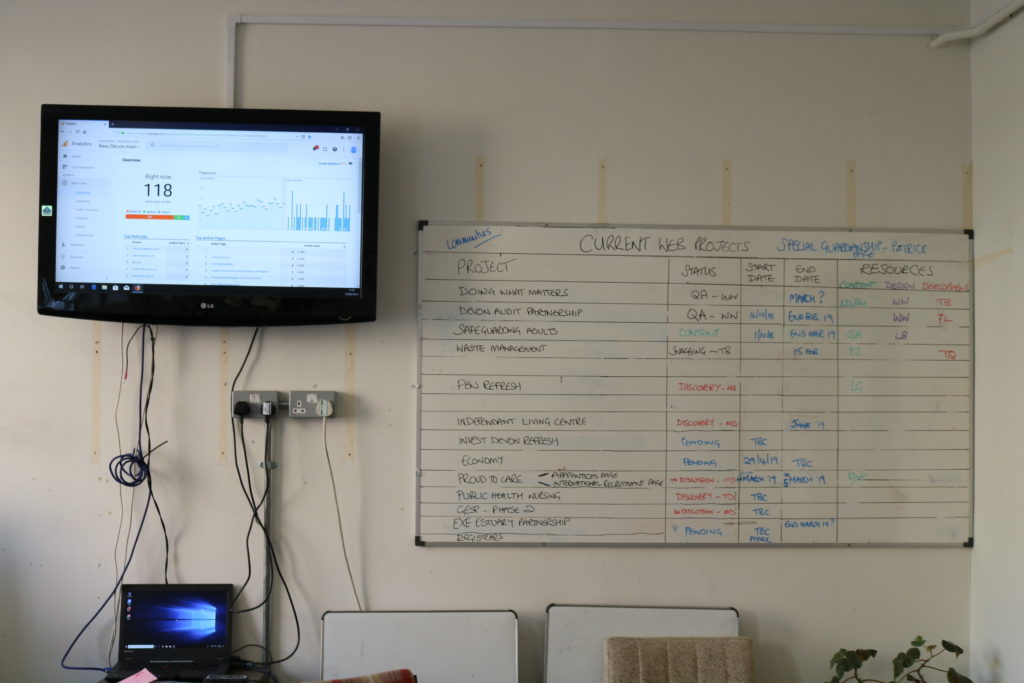
A screen in Devon County Council’s digital office displaying analytics.

A warning on longevity
We spoke to a member of the team responsible for Pinpoint, who taught us about the history of community directories in Devon. A joined up national directory, it seems, has been successful in the past. But government structure and strategy changes can threaten the longevity of these solutions, seemingly irregardless of their success.
“Parent Know How was a national directory of family services. It made it simple for people living and working in different local authorities to find an appropriate service.
Data custodian, Pinpoint Devon
But 2010 came and the government changed. The government decided they didn’t want Parent Know How and pulled the plug. It disappeared overnight. A parent looking for a service afterwards would have to go to their local authority, but most of the directories would just have the local flavour and no national flavour.”
The challenge of sharing data across directories
Pinpoint have learned valuable lessons about some of the challenges of reconciling service information across their family and adult service directories. It’s not just about avoiding duplication. Some entries written for a local or sector-specific context won’t make sense when pulled into a different directory.
“Common duplications might be for listings such as sports centres, that offered activities for both children and adults. In one directory the description would be tailored to children, the other one to more general services.”
Data custodian, Pinpoint Devon
Social prescribing from a service providers’ lens
We wrote last week about the necessity for accurate community services data in the world of social prescribing. It was interesting to understand this from the other side, by speaking to two service providers: Devon Carers and Drink Wise, Age Well, both members of CoLab.
Both sides are trying to talk, but through different channels
Community service providers invest significant time in building awareness of their offer amongst GP surgeries and other statutory professionals (e.g. hospitals). This is a challenge, with one expressing frustration at trying to get their information past practice managers.
“We have a prevention and campaigns team, a set of 4 people who are specifically going out to organisations, making sure they know we exist. Right now, we’re working to engage with hard to reach people in rural areas. I think for them, GPs are the way in.”
Drink Wise, Age Well
We heard last week from commissioners that there is also high demand for information about these services from GP surgeries, ambulances, hospitals, pharmacies etc. But the channels they use are very different.
“GPs are constantly asking us to do a directory and share it with them, everyone is.”
Community coordinator, CoLab
A joined up directory is only one tool of many that providers would use to drive awareness of their offer. Service providers need to use channels that are effective at reaching their target audience.
Community connectors can help, but the cost of using directories has to be worth the effort
Smaller voluntary-sector organisations are typically less tech savvy, which means that adding their information to a directory needs to be simple, or supported. Further, if they already have enough people accessing their services, they have no incentive to list them anywhere else.
“We have a community initiative fund for community sector organisations in Adur and Worthing. They have to apply via an online platform. But it’s asking for more information than it used to, so people are struggling. There are lots of pages to fill in, lots of stages. If they’re doing a small project, or not good at using computers, it’s quite alienating.
Partnerships Manager of a CVS, Adur and Worthing
Ultimately people do things because they want to see results. So if they have enough people turning up to their events to make it viable then that’s all they care about.”
Furthermore, some community services are sensitive, and cannot be made public. We heard stories about support services for domestic abuse victims or rehab clinics which had to keep their locations hidden from those who might target their attendees.
Short term commissioning doesn’t help
Short term funded services compound the difficulty of building awareness. Because so many of these vital services are awarded on one to five year contracts, the first few of those years are spent building awareness of what they do. Then at the point when they are delivering maximum impact, they are cut. GPs understandably struggle to keep up to date with those changes.
“We’re only a 5 year project, ending in March 2020. After that, there’ll be lots of people who need our help and we won’t be around! At the moment, we’re focusing on leaving a legacy of tools and learning behind, so all our work doesn’t go to waste.”
Drink Wise, Age Well
Where we’re going next
Next week, we’ll be sharing our reflections on how an OpenCommunity standard might be implemented and what value it could offer. Stay tuned.
